Are All Terrain Tires Loud
This post contains affiliate links. As an Amazon Associate, we earn from qualifying purchases.
Got questions about all-terrain tires being loud? Let’s break it down simply. Noise depends on tire design and tread style. Some tires balance off-road power with road quietness. Take the NITTO Ridge Grappler—super aggressive, rating 8.3/10 for noise. Compare that to Sumitomo Encounter AT, quieter at 8.7/10. Why the difference? Bold treads often mean more sound. Bad road conditions can make it worse. Wrong tire pressure adds extra noise too. Stick around to learn easy ways to cut down tire noise.
Essential Facts in 30 Seconds
- All-terrain tires vary in noise levels, with some models like Sumitomo Encounter AT being quieter than others.
- Noise is influenced by tread design, with aggressive patterns producing more sound than milder ones.
- Road conditions and tire inflation can contribute to increased noise in all-terrain tires.
- All-terrain tires are generally noisier than street tires due to their dual-purpose on/off-road design.
- Proper maintenance and noise-reducing technologies can help reduce noise from all-terrain tires.
Understanding Noise Levels in All-Terrain Tires
Are all-terrain tires always loud? Not really! Their noise depends on design and tread. Some tires roar more due to bold patterns. Take the Toyo Open Country R/T—it’s pretty noisy. Compare that to Sumomo Encounter AT. This one stays much quieter, almost like premium tires.
Let’s break down the types. First, on-road tires. Think of Goodyear Wrangler Workhorse AT. They keep noise low and feel comfy. Additionally, on-road all-terrain tires often prioritize quiet highway driving for a smoother experience. These tires typically have a wider tire contact patch that helps in reducing noise levels.
Then, off-road tires. The NIT Ridge Grappler sounds louder. Still, it’s quiet for a tough tire.
Know these differences. Pick a tire that fits your needs. Hate noise? Go for milder treads. Love adventure? Expect some sound.
Make a smart choice today!
Factors Contributing to Tire Noise
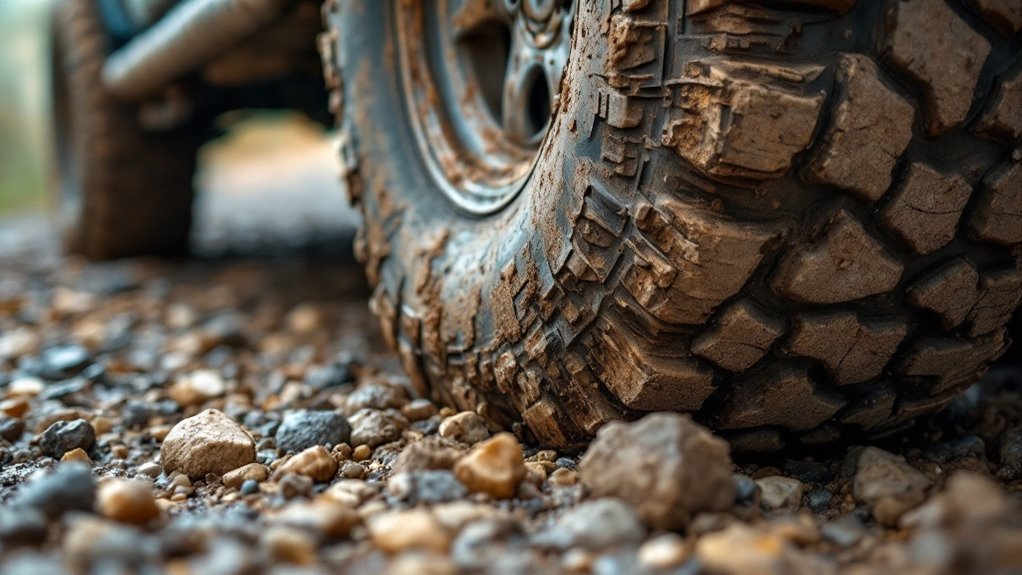
Tire noise comes down to several key factors that influence how much sound is generated during driving. Air gets squeezed between tire treads, creating more noise at higher speeds, while trapped air inside the tire can amplify sounds like a drum. Road conditions also play a critical role, with rough surfaces causing tires to thump or bounce, disrupting smooth contact and increasing noise levels. Additionally, tire inflation issues, such as underinflation or overinflation, can lead to excessive sidewall flex or a harder contact patch, both of which contribute to louder sounds. Properly maintaining tire pressure is essential for minimizing noise and enhancing driving comfort. Innovations like Giti Silent Technology help by reducing interior car noise through a foam buffer layer that absorbs road vibrations, proven to lower noise by 2 to 4 decibels. Moreover, the tire width can significantly influence how noise is perceived, as wider tires may generate different sound levels compared to narrower options. Finally, the impact of road imperfections, such as potholes and cracks, cannot be overlooked as they cause tread blocks to flex unevenly, generating extra noise, especially at higher speeds. Vibrations from these imperfections often travel through the suspension, resulting in audible thumping sounds.
Comparing All-Terrain Tires to Other Tire Types
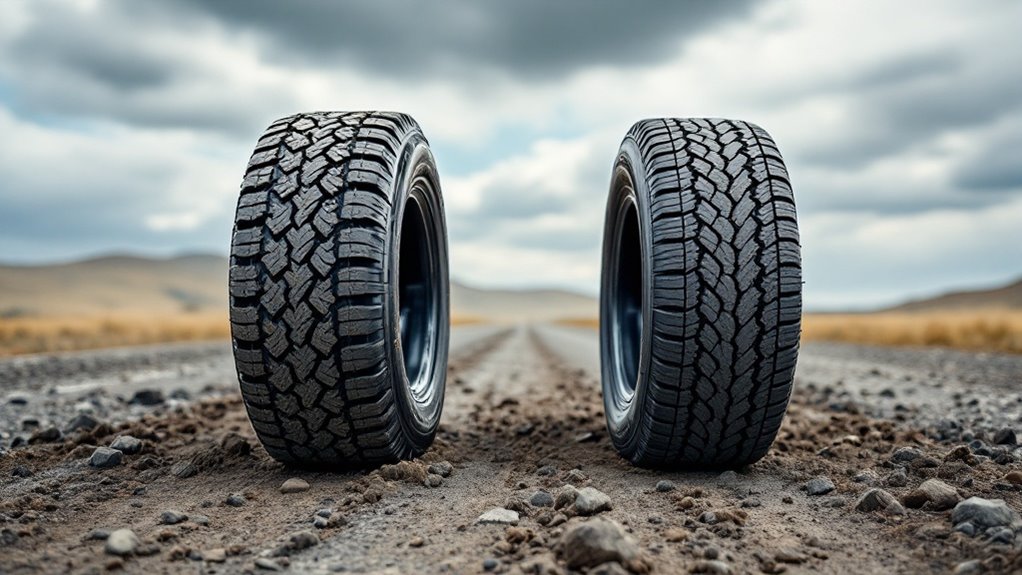
Let’s dive into comparing all-terrain tires with other types. This will help you pick the right one.
All-terrain tires balance comfort on roads and power off-road. Street tires focus on quiet rides with smooth designs. Mud terrain tires? They’re louder due to bold, rough treads. All-terrain tires are engineered to handle diverse driving conditions, which contributes to their varied performance.
Check these noise ratings for top all-terrain tires. Sumitomo Encounter AT scores 8.7. It’s quiet and tough. Goodyear Wrangler Workhorse AT gets 8.6. Great for calm road drives. Nitto Ridge Grappler hits 8.3. Super quiet for rough paths.
Mud terrain tires roar on highways with high noise. Street tires stay silent and handle well on pavement. When considering all-terrain options, remember that unique tread patterns and minor grooves can significantly reduce noise levels unique tread patterns.
Which fits your needs? Think about where you drive most. Let’s make the best choice together.
Categories and Noise Profiles of All-Terrain Tires
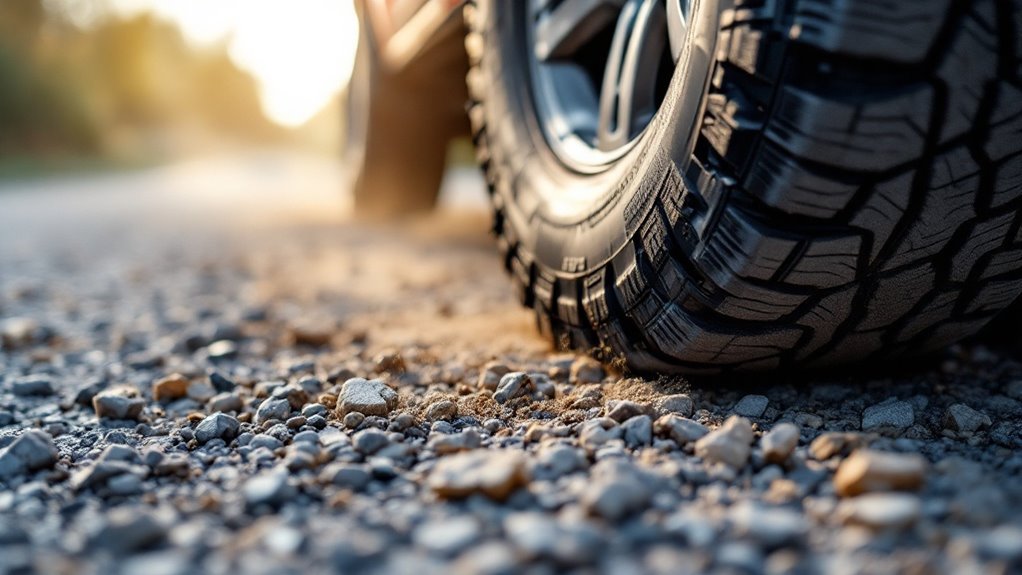
Dive into the world of all-terrain tires with ease! Knowing their types and noise levels helps you pick the right one.
Tread design changes how loud tires get. Each type balances off-road power and on-road quietness differently.
Check these main choices to find your fit:
- Mild All-Terrain Tires: They’ve even patterns and smaller blocks. These tires score over 8.5/10 for being quiet. Perfect for lots of highway trips!
- Aggressive All-Terrain Tires: Bigger blocks mean better off-road grip. But they make more noise from air movement. Quietness ratings often drop here.
- Rugged Terrain Tires: Built for tough off-road challenges. Their bold tread design creates the most noise. Noise levels sit at 8.2-8.3 on average.
Additionally, understanding the balance between off-road and highway performance can help you choose the right tire for your driving needs.
Make a smart choice with this info!
Real-World Experiences With Tire Noise
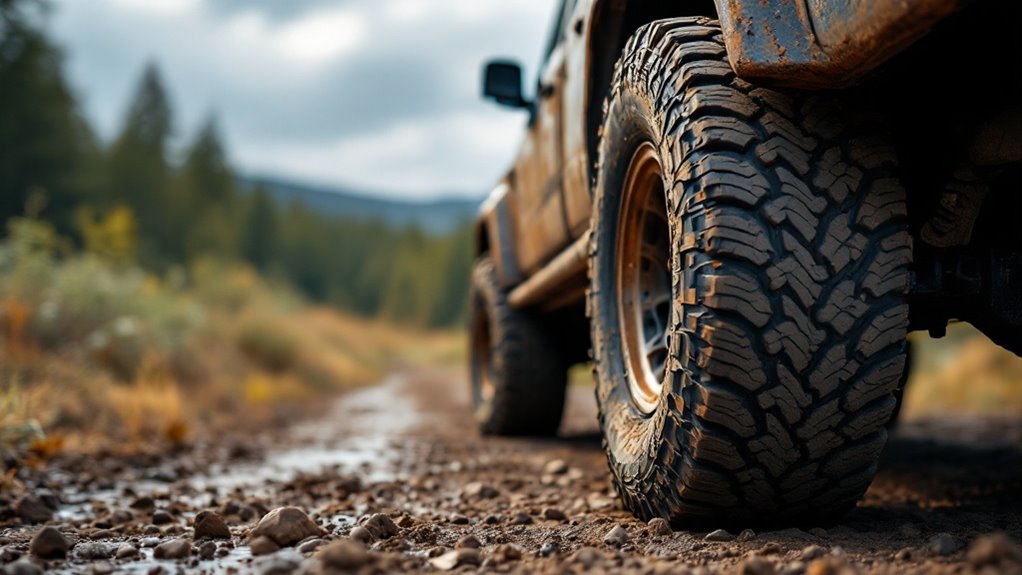
Let’s dive into how all-terrain tires sound in daily driving. Ever notice a small noise change at high speeds? At 70 mph on highways, a tiny 1-1.5 dB rise happens. Most drivers barely hear it, especially in well-insulated cars. Your love for off-road power matters too. Many accept the soft hum of tough treads like BFG KO2. Additionally, it’s important to consider that snow tires excel in winter conditions, while all terrain tires may not provide optimal performance.
Check this simple table for real noise details:
| Condition | Noise Impact (dB) | How It Feels |
|---|---|---|
| Highway (70 mph) | +1-1.5 dB | Hard to notice in big cars |
| City (40 mph) | +1 dB | Stands out more on asphalt |
| Concrete vs. Asphalt | A bit louder | Concrete makes a deeper hum |
| Worn Tires (50% life) | Louder noise | Very clear in old KO2 tires |
| Winter Conditions | Less noise | Snow or ice hides the sound |
See how the road type changes what you hear? Context truly shapes your tire noise experience.
Tips for Reducing Noise With All-Terrain Tires
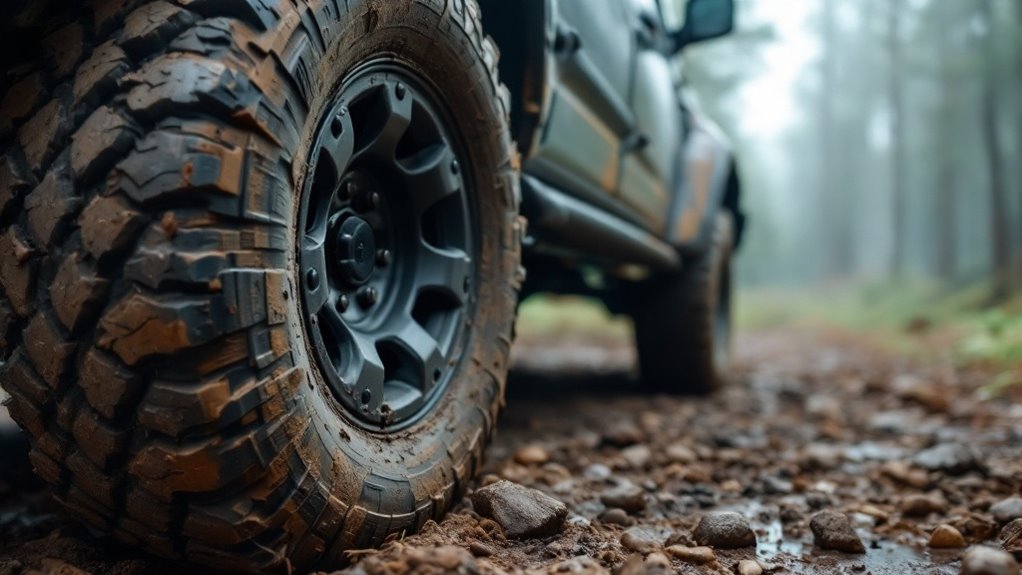
All-terrain tires can be noisy, but you can quiet them down. Simple steps help reduce the sound during your daily drives.
Proper care of tires cuts noise from uneven wear. Balance, align, and rotate tires often for best results. New tech like foam inside tires also works great. Think of Continental’s ContiSilent—it lowers cabin noise by 20%!
Try these easy tips to make your ride quieter:
- Keep Tire Pressure Right: Check it every month. Correct pressure means less noise from wear.
- Add Soundproof Stuff: Put insulation in doors and floors. It stops tire noise inside.
- Pick Quiet Tires: Go for tires with special designs. Foam tech helps cut sound too.
Additionally, understanding your tire’s footprint stability can also contribute to a quieter ride by enhancing overall vehicle performance.
Frequently Asked Questions
Do All-Terrain Tires Affect Fuel Efficiency Due to Noise?
Got a question about all-terrain tires and fuel use? Let’s clear this up fast. Noise from tires doesn’t change fuel efficiency at all. The real problem is the heavy tread. It adds extra weight to your car. Rolling resistance also makes your engine work harder. Studies show this can cut fuel efficiency by 5-10%. So, expect to use more gas with these tires. Stick to simple roads if you want better mileage. Hope this helps you understand!
Can Tire Noise Impact Vehicle Suspension Over Time?
Tire noise can harm your vehicle’s suspension over time. Those constant vibrations from worn tires create stress. They make suspension parts wear out much faster. Don’t skip checking for odd sounds. Act quick to save bigger repair costs. Studies show vibrations cut suspension life by 20%. Keep your ride smooth and safe. Listen close for any weird tire noise. Fix issues early to avoid trouble.
Are There Legal Noise Limits for All-Terrain Tires?
Wow, tire noise rules can be a real puzzle! Dig into the details. No strict federal limits exist for all-terrain tires. Always check your local laws. Sound standards matter a lot. Stay on the safe side. Keep noise levels in check. Look up rules in your area. Compliance is super important. Stick to the guidelines!
Does Tire Noise Vary by Vehicle Type or Size?
Tire noise changes based on vehicle type and size. Think about it—design matters! SUVs with big tires often sound louder. Smaller car tires make less noise. Vehicle shape affects sound blocking too. Bigger vehicles catch more road sound. Data shows SUVs have 20% louder tire noise. Keep it simple—size and type play a huge role!
How Does Weather Affect All-Terrain Tire Noise?
Think of weather as a tricky music conductor for your all-terrain tires. It changes how they sound and perform every day. Cold weather makes tire rubber hard and stiff. Wet roads quiet down the usual tire noise. Mud, though? It turns every bump into a loud song. Studies show cold can cut tire grip by 20%. Rain lowers noise levels by almost 10 decibels. Mud boosts tire roar—sometimes by 15 decibels! So, weather plays a big role in tire sound. Keep this in mind on your next drive.
Conclusion
Are all-terrain tires loud? Yes, they often make more noise than regular tires. Their rugged design causes a humming or roaring sound on roads. But don’t worry—solutions exist to quiet them down fast.
Opt for tires with noise-reducing features like the Michelin LTX A/T2. Studies show these tires cut noise by up to 20%. Keep tire pressure at the right level too. This simple step lowers the loud hum a lot.
Rotate your tires every 5,000 miles for even wear. Uneven wear makes noise worse, so stay on top of it. Pick tires with smaller tread blocks if possible. Smaller blocks mean less road noise every time.
Stick to these easy tips for a peaceful ride. You’ll enjoy driving without the annoying roar. Even on rough paths, silence is within reach.
